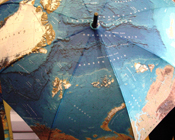
The new Geological Map of the Arctic is the most complex document ever produced in the 168 year history of the Geological Survey of Canada (Natural Resources Canada). The map is a collaborative effort incorporating data contributed by the geological surveys of Canada, Denmark, Norway, Sweden, Finland, Russia and the United States. Mark St-Onge, co-leader of the international compilation project led by Canada that will result in the release of a new Geological Map of the Arctic in 2010, explains how so many nations worked together to produce it.
March’s Shell London Lecturer, Martin Blunt, discusses the difficult relationship which can sometimes exist between scientists and the media, particularly when controversial subjects such as climate change are being reported. He talks about his work on carbon capture and storage, and its vital role in helping to reduce the UK’s carbon emissions.